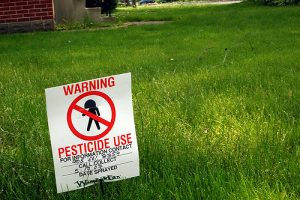Audra Goforth
Assistant News Editor
[email protected]
A UNC Asheville student sent an email to the Office of Sustainability in concern of Roundup being sprayed at and around the pollinator gardens on UNCA’s campus.
“I noticed them spraying Roundup during the spring semester,” junior Matthew Walton said. “In my opinion, it kind of goes against the progressive, liberal arts aspect.”
Walton sent an email to the Director of Sustainability, Sonia Marcus, on Sept. 23 expressing his concern of the campus’ use of the glyphosate pesticide known as Roundup.
“I was a little surprised by it, you know? Roundup too… That was in the spring though, well before the Bee Hotel made its appearance,” Walton said. “Then when the Bee Hotel happened, it weighed on my mind some more. I mean, maybe it was just jugs with a Roundup label? I had to look into it.”
Sonia Marcus directed Environmental Specialist Jackie Hamstead and UNCA Landscape Director Melissa Acker to reach out to Walton via email. Hamstead sent Walton a public document about the pollinator-friendly activities going on at UNCA.

“When we were putting our application together to become a bee campus, I drafted a document about the pollinator-friendly activities going on at UNC Asheville,” Hamstead said via email. “While we are always looking for ways to better serve the campus, I think that this document shows a demonstrated commitment to protecting pollinators.”
The document, Pollinator Friendly Activities at UNC Asheville, drafted by Hamstead, said the campus hand-pulls weeds in addition to the use of non-harmful pesticides.
“The broader campus community is invited to volunteer in the pollinator gardens. During the Greenfest Service Learning Day, which happens twice a year, students, faculty and staff join the grounds crew to plant native plants and remove invasive species — without harmful pesticides — in the pollinator gardens across campus.”
UNCA does not use neonicotinoids, an insecticide chemically related to nicotine that is harmful to bees, anywhere on campus, according to The Pollinator Friendly Activities at UNC Asheville. However, the pesticide glyphosate, a main ingredient in Roundup, is used in small doses on campus.
Walton said Hamstead confirmed UNCA is using Roundup on campus.
“I found out that they are actually using Roundup,” Walton said. “She [Hamstead] told me. I don’t agree with it, but I do see their reasoning and I hate to even say that.”
Melissa Acker said to Walton via email, one requirement for UNCA to be a bee campus is the development of an Integrated Pest Management Plan. Acker sent Walton the plan PDFs, which can be found on UNCA’s website.
“One requirement for Bee Campus is the development of an Integrated Pest Management Plan which details our strategies for using the least ‘toxic’ method to control pests on campus,” Acker said via email.
Acker said UNCA has pledged to use the hand pulling of weeds or use of “organic” products to control weeds.
“Hand pulling weeds adds a tremendous increase in labor hours to maintaining the campus and yet our grounds people are steadfast in the continued reduction in use of herbicides,” Acker said via email.
Acker also said UNCA keeps the majority of the campus grounds pesticide free, but occasionally spot sprays with glyphosate.
“For the last two years, 30 of 31 total acres of the academic core were pesticide free. Around the academic core and near pollinator gardens we, on occasion, spot spray with glyphosate to control tenacious or pernicious weeds,” Acker said via email.
“We continually try to learn from researchers what science has shown that supports our pollinators and what may do them harm,” Acker said via email. “While it is clear that an intact ecosystem, without human intervention and all of the detritus that comes with it, is what is best for all living things, it is less clear what exactly is causing damage to pollinator populations.”
In the Journal of Economic Entomology by Dr. John T. Trumble, an experiment performed by a group of scientists who tested 42 pesticides in September of 2015 was recorded.
Out of the 42 pesticides tested, glyphosate, also known as Monsanto’s Roundup, was found to be “relatively safe to foraging bees because they may kill less 1 percent of bees at the field use rate.”
Glyphosate, the main ingredient in Roundup, has a “very minor or no acute toxicity to honey bees based on 48-h mortality data, with the results being supported by an additional week-long observation.”
Walton said he wants UNCA to stay aesthetically pleasing while respecting the pollinators. He said he loves the Bee Hotel and wants the campus to think through their options carefully.
“I love bees. They are fascinating creatures and I want to make sure that we are doing our part in keeping them protected,” Walton said. “I know that we have to keep this campus aesthetically pleasing. I still love the Bee Hotel, but I am not giving anyone a pass on Roundup. I know UNCA has a lot of ground, but I don’t think the pollinator garden is the best place to use it. We just need to think this through carefully.”


















